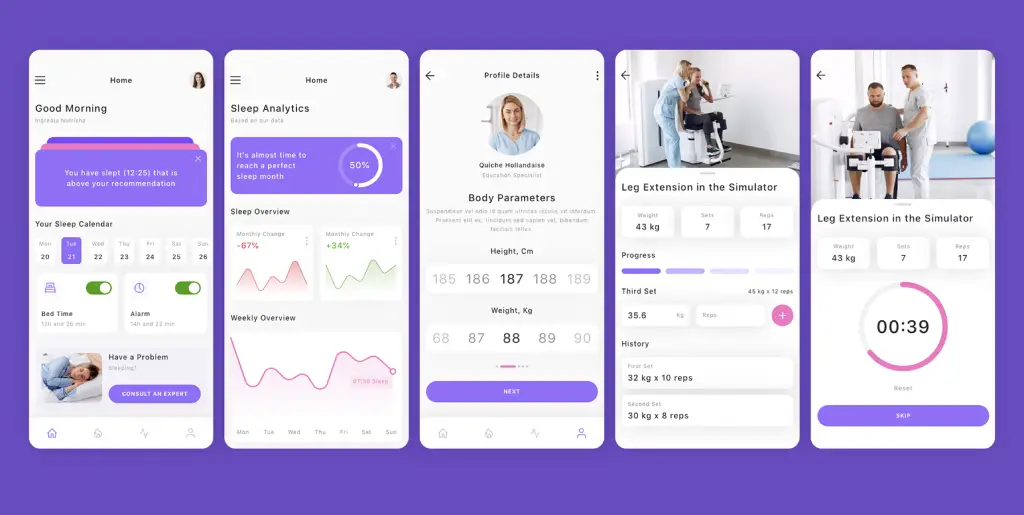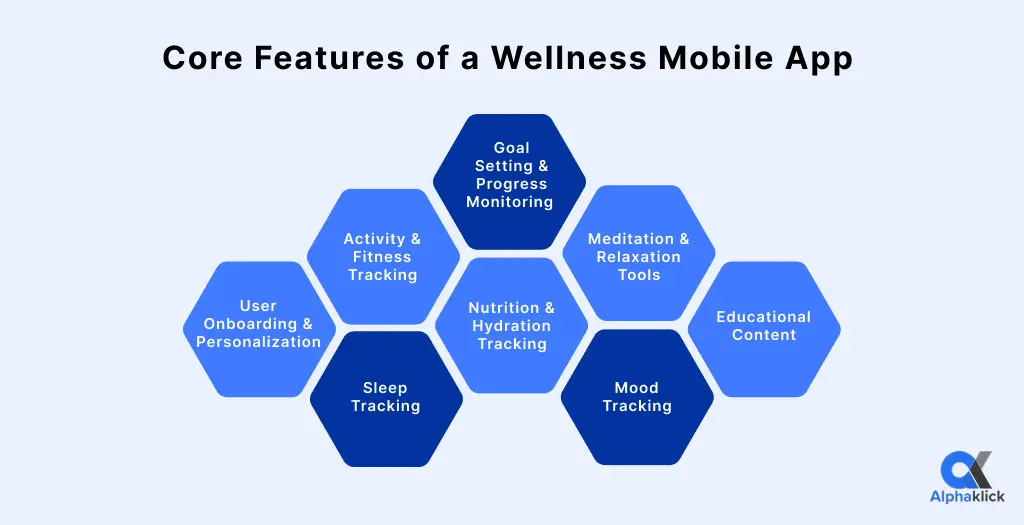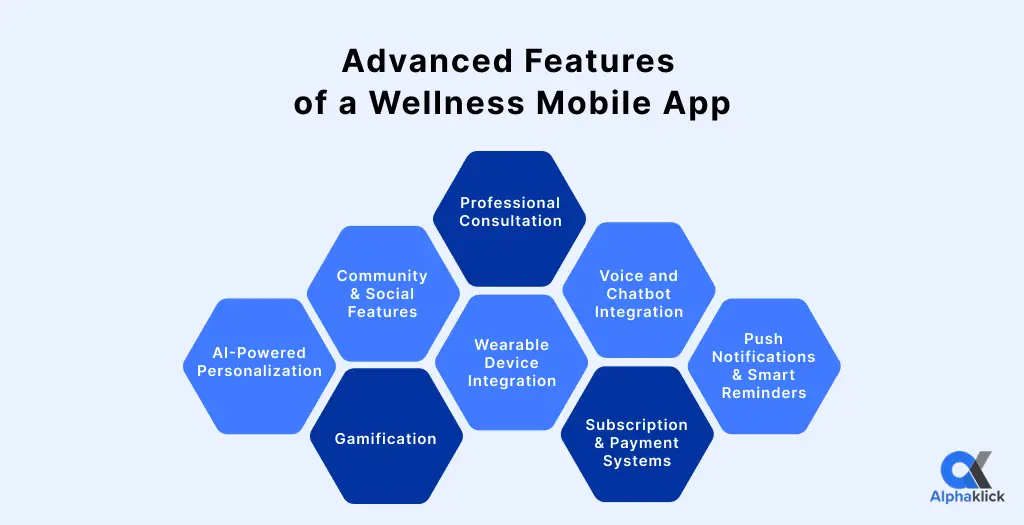Table of Contents
ToggleThere’s a quiet revolution happening, not in gyms or clinics, but on our smartphones. From daily meditation to mood tracking, sleep tracking, and nutrition & hydration tracking, mobile apps are transforming the way people care for their minds and bodies.
I am Abhishek Bhatnagar, with 18+ years of experience in mobile app development, and I have seen wellness evolve from a niche idea into a thriving digital movement. My team and I have built platforms that blend empathy, AI, and design, helping users find balance, motivation, and improved health through technology.
In this guide, we will explore the wellness mobile app development cost, essential health and wellness mobile app features, and how to estimate your wellness mobile app budget effectively in 2025.
What is a Wellness Mobile App?

A wellness mobile app is your digital partner for better living, helping users stay active, mindful, and balanced. It can track fitness goals, monitor sleep, reduce stress, or even guide daily meditation routines.
With years in this field, I have seen these mobile apps evolve from simple trackers to intelligent systems powered by AI, data, and personalization, turning wellness into an accessible lifestyle for everyone.
Common types include:
- Mental Health Apps (like Calm or Meditopia)
- Fitness & Workout Trackers
- Sleep and Relaxation Apps
- Nutrition & Diet Management Tools
- Corporate Wellness Platforms
Each category brings its own wellness mobile app design features and technical demands that shape the overall mobile app development cost breakdown for 2025.
If you’re planning to build something similar, our post on Build an AI-Powered Mental Health Mobile App explains the process step by step.
Top Categories of Wellness Mobile Apps
The online wellness space is vast. To help you plan your niche, here are the most common categories you can explore.
| Category | Description | Popular Features |
| Meditation & Mindfulness | Helps users reduce stress through guided audio, breathing exercises, and journaling. | Guided meditations, streak tracker, and offline access |
| Fitness & Workout | Personalized fitness plans, activity tracking, and goal-based coaching. | Step counter, progress analytics, wearable sync |
| Sleep & Relaxation | Helps users sleep better with soundscapes and AI sleep tracking. | Sleep timer, sound mixer, progress reports |
| Nutrition & Diet | Encourages healthy eating habits through calorie tracking and diet plans. | Barcode scanner, AI meal suggestions |
| Corporate Wellness | Designed for organizations to promote employee health and engagement. | Team challenges, HR dashboards, analytics |
When our dedicated mobile app developers built a corporate wellness platform last year, integrating AI and gamification increased employee engagement by 42%. It showed us how tech and motivation work best when combined.
Core Features of a Wellness Mobile App

When estimating the cost to build a wellness mobile app, it’s essential to begin with the fundamentals, the must-have health and wellness mobile app features that make your MVP usable, valuable, and scalable.
From my experience working on multiple wellness platforms, these are the features every first version should include:
- User Onboarding & Personalization: Simple sign-up and AI-based profile setup to tailor the experience from day one.
- Activity & Fitness Tracking: Logs steps, workouts, and calories burned, the backbone of almost every wellness mobile app.
- Sleep Tracking: Monitors sleep duration and quality with insights to promote better rest.
- Nutrition & Hydration Tracking: Helps users maintain diet balance by logging meals, calories, and water intake.
- Goal Setting & Progress Monitoring: Allows users to set health goals and visualize their improvements through intuitive dashboards.
- Meditation & Relaxation Tools: Guided meditation, sound therapy, or breathing exercises to reduce stress and anxiety.
- Mood Tracking: Lets users record emotions daily, helping them understand triggers and mental health patterns.
- Educational Content: Offers articles, short lessons, or daily wellness tips to encourage learning and consistency.
Pro Tip: These features form your MVP wellness mobile app cost baseline. Prioritize them first before scaling into complex add-ons.
Advanced Features That Boost User Engagement

Once your MVP is stable and gaining traction, it’s time to increase user experience with advanced wellness mobile app functionalities. These are designed to improve retention, increase engagement, and open monetization opportunities.
Here’s what my team often adds during the scaling phase:
- AI-Powered Personalization: Uses behavior and biometric data to deliver customized fitness, diet, or relaxation recommendations.
- Community & Social Features: Enables group challenges, leaderboards, or chat options, fostering motivation through peer connection.
- Gamification: Adds achievements, points, and badges to make wellness fun and habit-forming.
- Professional Consultation: Integrates live sessions or chat with certified coaches, therapists, or nutritionists.
- Wearable Device Integration: Connects with Apple Watch, Fitbit, and other trackers for real-time performance monitoring.
- Voice and Chatbot Integration: Offers conversational guidance and motivation via AI assistants.
- Subscription & Payment Systems: Seamlessly handles memberships, in-app purchases, and recurring billing.
- Push Notifications & Smart Reminders: Keeps users on track with goal-based nudges and motivational quotes.
These advanced features typically add 30–50% to the wellness mobile app development cost, but they also significantly boost retention and revenue. In one of our projects, adding gamification + AI-based personalization improved daily active usage by over 40%.
To explore how AI and automation are transforming app capabilities, check out our detailed article on AI Benefits Mobile Apps in Various Industries.
Wellness Mobile App Development Cost Breakdown
The wellness mobile app development cost varies based on design quality, chosen technology stack, features, and where your mobile app development team is located.
From my experience leading projects across industries, most wellness mobile apps fall into three investment phases: MVP (basic), growth (medium), and AI-powered (advanced).
Before delving into categories, here’s a general mobile app development cost breakdown for 2025 across major stages:
| Development Stage | Average Cost (USD) | Description |
| UI/UX Design | $4,000 – $8,000 | Creating wireframes, layouts, and intuitive user flows. |
| Frontend & Backend Development | $15,000 – $25,000 | Building core logic, database, and API integrations. |
| AI & Wearable Integration | $5,000 – $12,000 | Adding personalized data sync, fitness tracking, and device connectivity. |
| Testing & Quality Assurance | $3,000 – $6,000 | Ensuring security, performance, and bug-free operation. |
| Deployment & Maintenance | $2,000 – $5,000/year | Ongoing updates, monitoring, and technical support. |
Pro Tip: For startups, I always recommend launching an MVP first. The MVP wellness mobile app cost is usually between $20,000 – $30,000, enough to validate your concept without overspending.
Once traction grows, you can scale into advanced wellness mobile app functionalities and integrations.
Regional Cost Comparison
The overall wellness mobile app development cost also depends heavily on where your developers are based.
Here’s a quick comparison of average market rates:
| Region | Hourly Rate | Approx. Total Cost |
| India | $25 – $45/hr | $25,000 – $35,000 |
| Eastern Europe | $40 – $60/hr | $35,000 – $50,000 |
| USA / UK | $80 – $150/hr | $60,000 – $90,000 |
From my experience, development teams in India deliver excellent value, offering the same functionality and quality as Western agencies but at 40–60% lower rates. This cost advantage allows brands to invest more in UI, AI integrations, and marketing without inflating the overall budget.
You can also explore our latest research on Health Monitoring Mobile App Development Guide to understand how specific functionalities affect your budget.
Cost Comparison by App Complexity for Wellness Mobile App
Here’s a simple overview of how your wellness mobile app development cost changes depending on your app’s scope and functionality level:
| App Type | Estimated Cost (USD) | Ideal For | Key Features |
| Basic Wellness App | $15,000 – $25,000 | Startups testing an idea | Step tracking, nutrition & hydration tracking, basic goals, mood journal |
| Medium-Level Wellness App | $30,000 – $50,000 | Growing brands or funded startups | Personalized dashboards, AI mood tracking, wearable integration, sleep & hydration monitoring, community features |
| Advanced AI Wellness App | $60,000 – $90,000+ | Scalable health platforms | Predictive analytics, AI-powered mood tracking, nutrition & sleep insights, chatbots, live expert sessions, smart recommendations |
From my team’s experience, AI integration and real-time personalization add the most value, but they’re also the biggest cost drivers in healthcare mobile app development. Still, if planned strategically, these features quickly pay off through user retention and premium subscriptions.
When clients approach me for a fitness mobile app pricing guide or to estimate their wellness mobile app budget, my advice is simple:
Build smart, not big.
Start lean, collect real user feedback, and scale with precision. This approach minimizes risk, optimizes spending, and ensures your product evolves in the right direction.
For a detailed comparison of leading agencies, explore our curated list of Mobile App Development Companies in India, perfect if you’re shortlisting a trusted partner.
Legal & Compliance Requirements
When developing a wellness or healthcare app, one of the most overlooked, yet critical, factors affecting both trust and cost is legal compliance. Every platform that collects or processes user health data must follow strict privacy laws to protect sensitive information.
In my experience, many first-time founders underestimate how much compliance can influence the overall wellness mobile app development cost. Implementing secure data handling, encrypted storage, and legal approvals early can save thousands later.
Here are the key requirements to plan for:
1. HIPAA / GDPR Compliance:
If your mobile app targets users in the US or EU, you must comply with the Health Insurance Portability and Accountability Act (HIPAA) or the General Data Protection Regulation (GDPR).
These frameworks define how personal health data should be collected, stored, and shared. My team always integrates privacy-by-design principles from the start to avoid legal hurdles later.
2. Data Privacy and Consent Forms:
Before collecting any personal metrics, such as heart rate, mood logs, or location data, apps should obtain explicit user consent.
Transparent consent forms build trust and meet legal requirements under both HIPAA and GDPR.
3. Secure Data Storage and Encryption:
All sensitive data (from login credentials to health reports) must be encrypted in transit and at rest.
We usually implement AES-256 or SSL encryption to ensure end-to-end protection. Regular vulnerability audits and secure cloud hosting also help minimize risk.
Tip: Always factor in compliance when estimating your healthcare mobile app development cost. It not only protects your users but also strengthens your app’s credibility in the global wellness market.
Curious about region-specific development pricing and regulations? Don’t miss our detailed guide on the Cost to Develop a Healthcare Mobile App in India? for an in-depth breakdown.
How to Choose the Right Wellness Mobile App Development Partner
Building a wellness mobile app is more than just writing code; it’s about crafting a product that inspires trust, engagement, and long-term growth. Whether it’s mood tracking, sleep tracking, or nutrition & hydration tracking, your app should help users achieve real results while maintaining reliability and privacy.
That’s why choosing the right mobile app development company in India is just as important as your idea itself.
The ideal partner brings not only technical skills but also a deep understanding of the wellness and healthcare domain, where user psychology, compliance, and experience design all come together. Here’s what to look for:
- Experience in Healthcare App Development Cost Optimization: A skilled team knows how to balance features, design, and performance, ensuring you stay within your wellness mobile app development cost targets without compromising quality.
- Expertise in HIPAA-Compliant Mobile Apps: Wellness mobile apps handle sensitive personal data. Your partner must understand HIPAA compliance mobile apps, encryption standards, and secure data storage to maintain user trust and meet regulations.
- Transparent Pricing & Process: Choose a company that provides a clear mobile app development cost breakdown for 2025, detailed timelines, and milestone-based billing. Transparency at every stage avoids unpleasant surprises later.
- End-to-End Development & Support: From UI/UX design and backend architecture to launch and maintenance, your ideal team should provide full-cycle wellness mobile app development. Regular updates, bug fixes, and performance tracking are important, especially for apps that rely on AI-based mood tracking, sleep monitoring, or hydration tracking.
At AlphaKlick, my team and I follow exactly this full-cycle approach. From designing engaging interfaces to ensuring secure, scalable deployment, we focus on building wellness mobile apps that perform smoothly and grow sustainably.
If you are planning your own project, I would love to help. You can book a free consultation with me personally. I will walk you through your ideas, address your concerns, and help you plan your next steps with clarity and confidence.
FAQs: Wellness App Development Guide
1. How much does it cost to build a wellness mobile app?
The cost to build a wellness mobile app typically ranges from $25,000 to $70,000, depending on complexity and region.
2. How long does it take to develop a wellness mobile app?
An MVP takes 3–4 months; a full-featured version may take up to 6 months.
3. What makes a wellness mobile app successful?
A successful wellness mobile app combines great UI/UX design, accurate data tracking (including mood tracking, sleep tracking, and nutrition & hydration tracking), and strong emotional engagement.
4. How much is the ongoing maintenance cost?
The wellness mobile app maintenance cost is usually 15–20% of the initial development annually for updates, bug fixes, and hosting.

